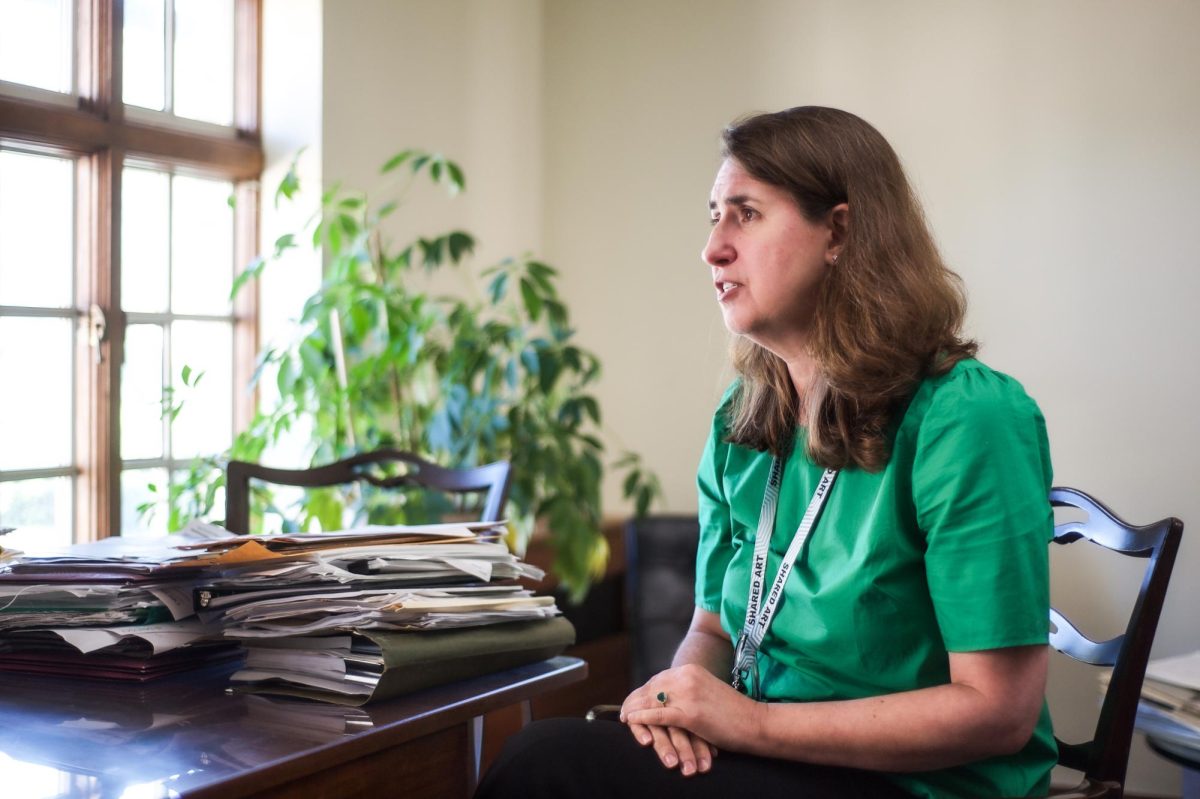
Nathan A. Greenberg Professor of Classics Kirk Ormand specializes in researching sexuality in the ancient world, archaic Greek poetry, Sophocles, Euripides, Lucan, and the Greek novel. He recently published a book chapter in the new Oxford Critical Guide to Homer’s Iliad. Ormand’s essay delves into book 19 of the 24 books of the Iliad.
This interview has been edited for length and clarity.
What led you to study classical literature?
I took a class in college on ancient Greek and Roman drama and really enjoyed it. The professor said, “If you’re really interested in this stuff, you should start learning Greek.” So the next semester, I started learning Greek, and I just kind of fell into it, to be honest.
Can you describe your book chapter in the new Oxford Critical Guide to Homer’s Iliad?
A little bit of context: It’s meant as a resource for scholars and teachers who are teaching the Iliad. The way that the book is organized is that each book of the Iliad has a chapter written about it by a different scholar. My job for this book was to provide a guide to book 19 of the Iliad. My essay takes the reader through some of the important themes and poetic devices. In book 19, Achilles, who has been angry at the Greeks and refusing to fight in the Trojan War, finally renounces his anger and agrees to go back, fight for the Greeks, and avenge his dead friend, Patroclus. So most of book 19 is organized around the process of Achilles “unsaying” his anger. That’s what the Greek literally says. It’s not an interpretive essay in a standard format; it’s more of a guide.
What was your writing process like?
The first thing that I did was lock myself in a small room. I spent about a month reading book 19 very carefully in Greek, with several commentaries open, figuring out which parts of the book I wanted to highlight and talk about. After I had done that, I did a bibliography review and found articles that dealt with certain aspects of that book. For example, at the end of the book, there is an episode where a horse by the name of Xanthus talks directly to Achilles. Talking horses are abnormal in the Iliad, so when Xanthus talks to Achilles, it arrests our attention. Xanthus tells Achilles that since he’s going to go back into battle, he’s going to die soon. There are no other episodes in the Iliad with talking horses. It’s not a world in which that sort of thing usually happens. I had to go back and try to find everybody who’s written articles about these talking horses. That led me down a whole series of interesting rabbit holes. In the end, I don’t know why we have a talking horse. It seems to be borrowed from some other epic traditions that are partially lost. It seems to be the case that Homer has invented this episode because it reminds us of Achilles’ mortality in a particularly striking way. That’s essentially the process: read the text very carefully, go down a bunch of bibliographic rabbit holes, figure out what I want to say, and then try to write it in under 7,000 words.
How does your work as a professor influence your writing?
One of my other books is about ancient Greek and Roman sexuality. That book really came out of my teaching a class on ancient Greek and Roman sexuality. After I taught the class about five times, I sat down and I said, “You know what, I’m just going to take this syllabus and I’m going to write it as a book.” The book came directly out of the class and discussions that I’d had with students in the class. From that, I developed a coherent set of ideas about how ancient Greek and Roman sexuality worked. In writing that book, I went through the syllabus one chapter at a time and produced it. In that sense, my teaching is often directly related to my research and vice versa. Sometimes it’s not nearly as connected. I have another book on a fragmentary poem of Hesiod, and it’s not a poem that I can teach easily to undergraduates. So there’s not always a direct connection, but when there is, it’s fun.
How do you approach the topic of translation when teaching translated texts?
We’re always reading English translations of one sort or another. In recent years, I’ve been switching up the translations that I teach. This year I happen to be teaching Emily Wilson’s brand-new translation of the Iliad. In terms of how to approach it in class, it’s a little bit tricky. Every translation is always a work of art in itself, and you want to teach the translation as it is. Emily Wilson has certain points and emphasies that she wants to make, and so when I teach her Iliad, I’m just teaching her Iliad. On the other hand, every now and then I’ll see a moment where she’s translated something a little differently than I would. In class, I will often say to the students, this is what the Greek says, word for word, and this is what Wilson has said. Now, you can think about how that puts a particular emphasis on that line, or on that episode. So, I try to be aware of translation, but every translation is also an interpretation. To a certain extent, I want to allow that interpretation to stand on its own.
Do you have a favorite class that you’ve taught?
My favorite class is always the class I’m teaching right now. That’s the right answer to give. I think whatever I’m teaching at the moment, I tend to get excited about. So, right now, my favorite class is Ancient Greek and Roman Epics and 200-level Greek, which this year happens to be reading Homer’s Iliad in Greek.












